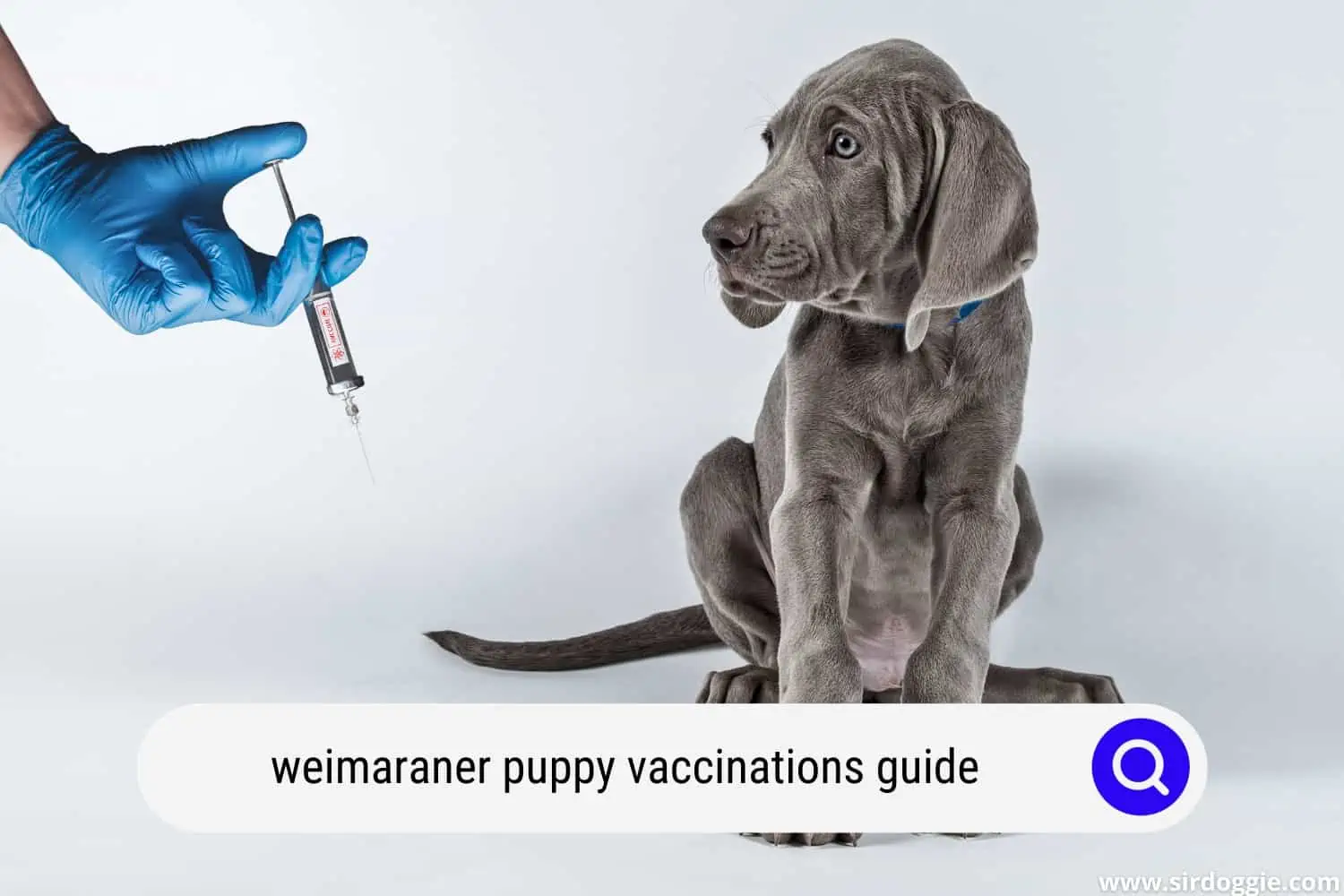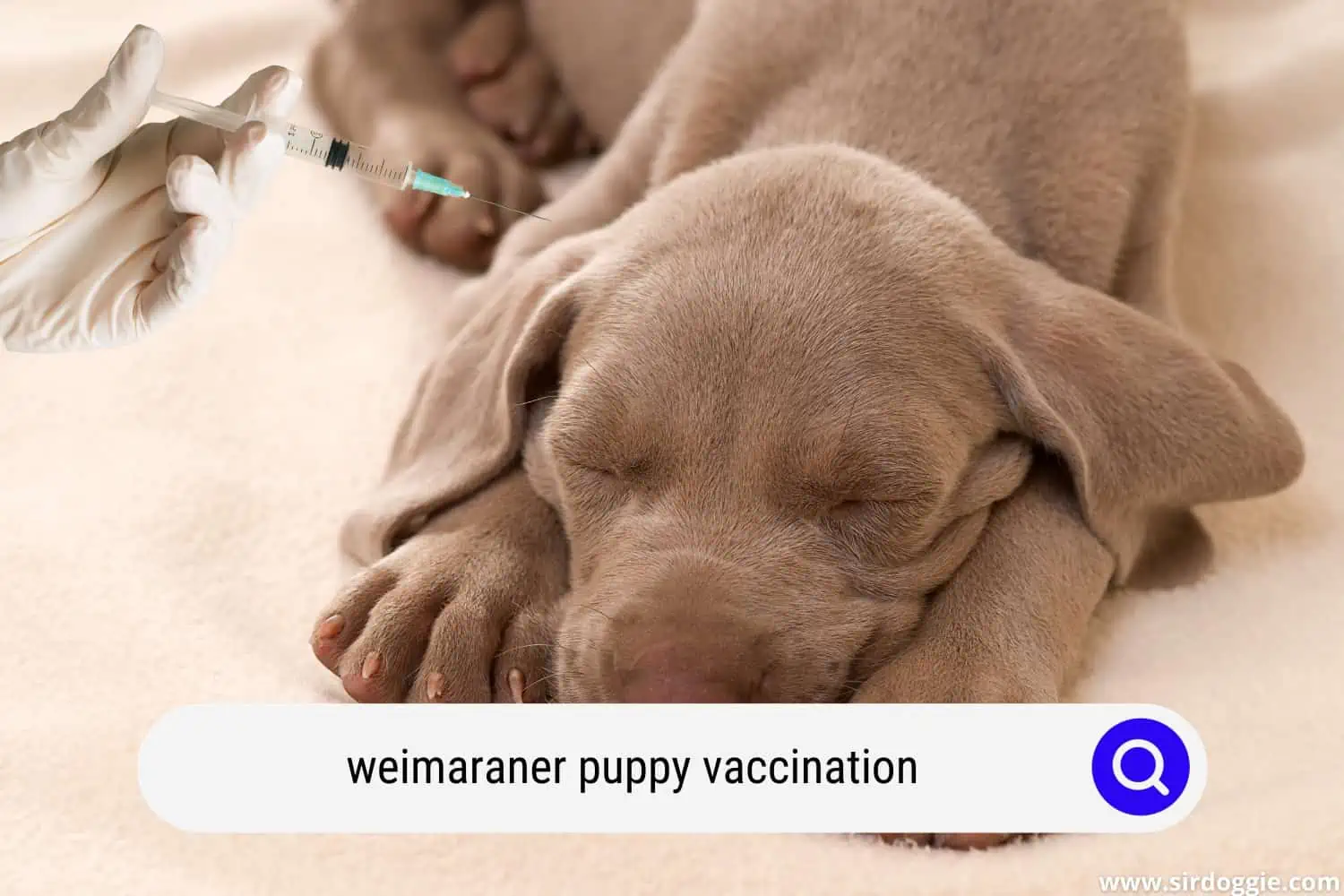Weimaraner Puppy Vaccinations Guide
Having a pet, regardless of its species, is a great responsibility. Each of them (dogs, cats, snakes, birds, etc.) must be cared for in specific ways. A pet is another member of our family, and for that reason, we must be willing to take proper care of it so that it has a good quality of life.

As we know, dogs are the most common animals among families in the world. If we have a canine, our responsibility is to take care of it to make sure it is in good health. We have to help our pet to prevent any disease so that it has a healthy and happy life.
We will talk particularly about the Weimaraner dog. It is considered an excellent family canine due to its characteristics. The Weimaraner is a loving and friendly breed with its owners and human family members, especially children.
These canines have a high level of physical activity, so they require daily exercise. In short, their owners must provide them with a daily exercise routine to keep them physically and mentally healthy.
Generally, Weimaraners are very healthy and strong. However, like other dogs such as the Vizsla, they can suffer from some genetic problems. For that reason, if you are thinking of buying or adopting a canine of this breed, you should know what type of vaccines to apply.
Weimaraner Puppy Vaccinations Guide
Acquiring a dog, regardless of its breed, is one of the most important decisions in the life of a person or family. As owners of a canine, there are many aspects that we must take into account when guaranteeing our pet an excellent quality of life.
Generally, when we buy or adopt a dog, we do it while they are still puppies. For that reason, one of the most important things we have to consider is vaccination.
Whether it is a Weimaraner or any other breed of dog, we must bear in mind that these types of animals are exposed to certain diseases. There are vaccines that must be applied to all dog breeds, but there are others that have to be applied to specific breeds of dogs.
There are mandatory vaccines and optional vaccines. The mandatory ones should be used in all dog breeds, while others will depend on certain factors surrounding our little Weimaraner.
Our mission is to ensure the health of our Weimaraners through proper vaccinations. The most advisable thing is to take it to the vet since he or she knows the necessary vaccines for this breed.
Core and non-core vaccines that you should consider for your Weimaraner puppy are used to protect against:
Canine Distemper
It is a virus that affects the gastrointestinal, central nervous, and respiratory systems of a canine. The Canine Distemper is a contagious disease that causes serious damage to the health of our Weimaraner.
This virus can be transmitted to our dog in several ways. First, our Weimaraner can be spread directly from another dog with this virus either through direct contact, urine, saliva, or blood. In addition, if our pet eats from the food or water container of another infected canine, then it will also be at risk of becoming infected.
Like any other disease, the Canine Distemper presents different symptoms that allow us to know if our Weimaraner has this virus. Some of them are:
- Sneezing.
- Mucus.
- Cough.
- Fever.
- Vomiting.
- Lethargy.
- Diarrhea.
- Depression.
- Loss of appetite.
- Paralysis.
- Seizures.
- Death (in severe cases).
It is important to take your Weimaraner to the vet so he or she can diagnose the Canine Distemper. The vaccine necessary to face this disease is DHPP, which is one of the first vaccines administered to dogs when they are puppies. It is a combined vaccine that helps prevent four viruses, including Canine Distemper.
It is necessary to carry out several tests to analyze the seriousness of the situation globally. Generally, this virus has no cure, so it is important to carry out a series of treatments to control it.
Adenovirus Type 2
This virus can attack any canine. It is produced by an inflammation in the liver caused by a poor diet or exposure to different toxins.
Adenovirus can, in turn, trigger Kennel Cough, which is one of the most contagious diseases in dogs. Furthermore, it is a disease that causes respiratory problems in canines.
Kennel Cough is transmitted from one dog to another, either through physical contact or through the air (coughing). The most common symptoms produced by Adenovirus are:
- Dry cough.
- Fever.
- Sickness.
- Lethargy.
- Lack of appetite.
- Runny nose.
Like the previous virus, the DHPP vaccine is necessary to prevent Adenovirus Type 2. We bear in mind that we must take our Weimaraner to the vet when we notice some of the symptoms mentioned above. He or she will be in charge of indicating the treatment so that your dog can recover.
Parvovirus
Parvovirus is a contagious and lethal disease that affects the intestines of the canine. It is a very strong virus that can be present anywhere for a long time. For that reason, it is common for dogs to become infected in kennels, dog shelters, parks, etc.
This disease is transmitted orally whether our Weimaraner comes in contact with infected urine, feces, food, or objects. The most common symptoms of this virus are:
- Severe vomiting.
- Decreased appetite.
- Fever.
- Diarrhea.
- Dehydration.
- Weakness.
- Fatigue.
- Death (in extreme cases).
The DHPP combination vaccine is the best option to prevent this disease. We have to take into account that this virus usually attacks canines under 6 months or adult dogs that are not vaccinated. That is why it is important to prioritize administering the vaccine as soon as we acquire our Weimaraner.
Parainfluenza
It is another of the main diseases for which we must vaccinate our Weimaraner. This virus is also one of the triggers for Kennel Cough. It is transmitted from one dog to another through the air through the tiny droplets that come out of the canine’s nose or mouth.
This virus has an incubation period that varies between 4 and 7 days. In this period, the Weimaraner will not present any symptoms. After that time has elapsed, the symptoms that your pet could present are:
- Fever.
- Nasal and ocular discharge.
- Lethargy.
- Loss of appetite.
- Vomiting.
- Cough.
- Bronchopneumonia.
Like the previous diseases, DHPP should be used as the main vaccine to combat Parainfluenza. Generally, the vet will recommend an antibiotic treatment to prevent complications.
Rabies
It is a highly contagious viral disease that can be fatal to a dog. This virus is found in the infected animal’s saliva, so one bite will be enough to infect another dog or any mammal.
The most notable symptoms of this virus are:
- Anxiety.
- Drooling.
- Headache.
- Fever.
- Apathy.
- Headache.
- Aggressiveness.
- Vomiting.
- Hydrophobia.
- Death.
Rabies has no cure, so it is essential to apply the vaccine to our Weimaraner within the deadlines established in its vaccine schedule.
Bordetella
It consists of a group of 3 pathogenic bacteria (Bordetella pertussis, Bordetella parapertussis, and Bordetella bronchiseptica), which affect not only canines but also humans and other animals.
It is a highly contagious bacteria transmitted either by direct contact or through the air and, like other viruses mentioned above, it can cause Kennel Cough.
The most common symptoms are:
- Constant cough.
- Vomiting.
- Sickness.
- Fever.
- Lethargy.
- Loss of appetite.
The Bordetella vaccine is administered through an injection or nasal spray. Importantly, the immunity of this vaccine lasts for about one year.
Leptospirosis
Canine Leptospirosis is a highly infectious disease of bacterial origin that affects the kidneys and liver of dogs. The transmission of this disease occurs through the urine of the infected animal.
The symptoms of this disease are:
- Frequent and abundant urination.
- Fever.
- Vomiting.
- Diarrhea.
- Loss of appetite.
- Lack of energy.
- Dehydration.
- Cough.
- Difficulty breathing.
The Leptospirosis vaccine is optional as it will mainly depend on where your Weimaraner lives.

Weimaraner Puppy Vaccination Schedule
As we have said previously, there are core and non-core vaccines. Therefore, it is not mandatory to give all the vaccines to your little Weimaraner. The most important and required are those to combat Canine Distemper, Adenovirus Type 2, Parvovirus, Parainfluenza, and Rabies.
The vaccine schedule recommended by the Weimaraner Club of America Health Committee is:
- During the first 8 weeks of age, your Weimaraner must be vaccinated against Canine Distemper, Adenovirus Type 2, Parvovirus, and Parainfluenza.
- At 12 weeks, the same vaccines above are necessary.
- After the first 3 months of age of your Weimaraner, it is advisable to vaccinate against Rabies.
- Between weeks 15 and 16, “an antibody titer is recommended to confirm immunity since a small proportion of puppies may still not be covered,” according to the Weimaraner Club of America Health Committee.

Family Dog Expert Author
Hi there! I’m Stuart, a devoted dog lover and family dog expert with over a decade of experience working with our furry companions. My passion for dogs drives me to share my knowledge and expertise, helping families build strong, loving bonds with their four-legged friends. When I’m not writing for SirDoggie, you’ll find me hiking, playing with my beautiful dog, or studying music.